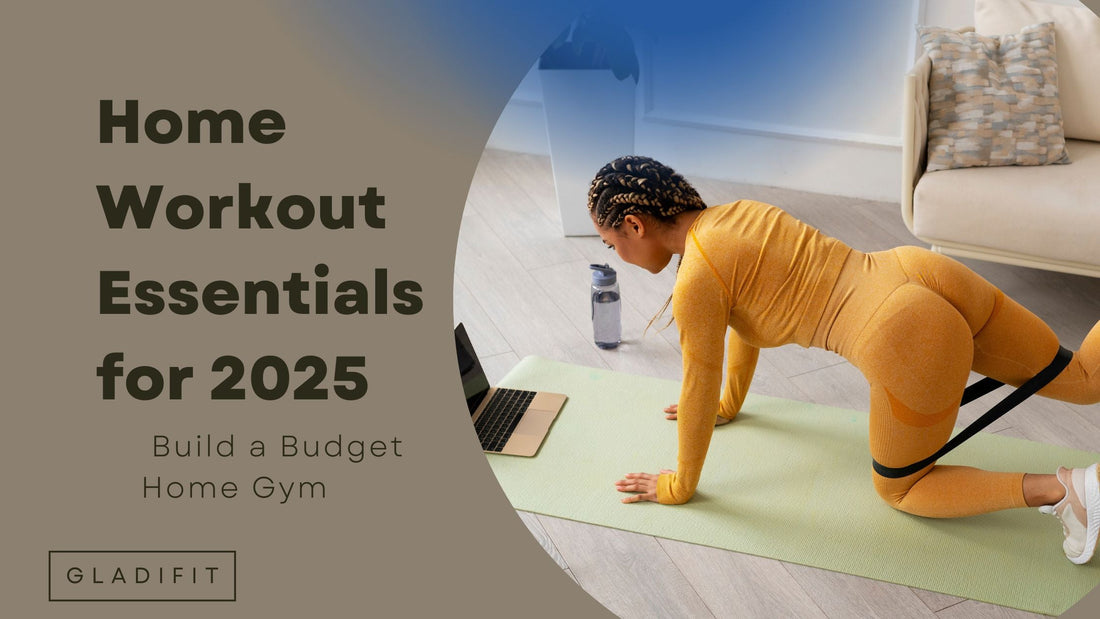
Home Workout Essentials for 2025: Build a Budget Home Gym
Share
You don’t need a garage full of equipment to get big results. This guide gives the 7 must-have items for a compact, budget-friendly home gym, a 4-week starter plan.
Why build (or upgrade) a home gym in 2025?
More people in the U.S. are pairing smart wearables and mobile workout apps with simple at-home equipment to create routine, measurable progress without a gym membership. Whether you’re working from home, short on time, or prefer privacy, investing in a small selection of high-impact gear + a simple supplement stack will deliver the best return on your time and money.
7 Essentials for a Budget Home Gym (what to buy first)
1) Resistance bands — the #1 space-saver
Why: Portable, cheap, and extremely versatile. Resistance bands let you do rows, presses, deadlifts and mobility work with progressive difficulty. Buy a set that includes light → heavy levels and a door anchor.
Shop GladiFit resistance bands
2) Adjustable dumbbells or a small kettlebell
Why: Heavy loading drives strength and visible results. Adjustable dumbbells save space vs full sets. If budget is tight, start with one adjustable pair or a single versatile kettlebell.
Shop GladiFit adjustable dumbbells
3) A reliable fitness tracker / wearable
Why: Tracking steps, heart rate, workouts and sleep helps people stay consistent. Look for basic heart-rate monitoring, step tracking, and workout detection, you don’t need the most expensive model to get value.
Shop GladiFit fitness trackers
4) Creatine + a quality protein powder
Why: Small, inexpensive supplements that are widely studied and help recovery and strength gains when paired with resistance training. Creatine monohydrate (3–5 g/day) and a whey or plant protein to support daily protein goals are the staples.
Shop GladiFit creatine · Shop GladiFit protein
5) Recovery tools: foam roller + massage ball (optional: massage gun)
Why: Faster recovery means higher training frequency. A $20 foam roller and a cheap massage ball will reduce soreness and improve mobility. Add a massage gun for higher-end bundles.
6) A jump rope or mini stepper (cardio without leaving the house)
Why: Great low-footprint cardio options. Perfect for HIIT, calorie burn, or an “indoor walking workout” on days you can’t go outside.
Shop GladiFit cardio essentials
7) A good mat + smartphone mount for recording
Why: Safety and content creation. A non-slip mat protects knees and gears for mobility work. A phone tripod helps you film short clips to share on TikTok or Instagram.
4-Week Beginner Home Workout Plan (2–3 sessions/week)
Keep sessions 30–40 minutes. Focus on full-body compound moves and progressive overload.
Week A: Strength (2x per week)
- Warm-up: 5 min mobility / dynamic stretching
- Resistance band or dumbbell squat — 3 sets x 8–12 reps
- Push (push-ups or dumbbell press) — 3 x 8–12
- Row (band or dumbbell row) — 3 x 8–12
- Deadlift (single-leg or band Romanian) — 3 x 8–10
- Core: Plank 3 x 30–60s
Week B: Conditioning / Mobility (1x per week)
- 10–15 min indoor walking / jump rope intervals (30s on / 30s off, 12 rounds)
- 20 min somatic / mobility flow or low-intensity "zone zero" session (light movement, stretching)
Progression: each week add 1–2 reps per set or increase band resistance. After 4 weeks, bump to 3 strength sessions / week.
- home workout equipment
- resistance bands, creatine benefits, best home gym 2025, indoor walking workout.
FAQ
Q: What is the cheapest way to start strength training at home?
A: Start with resistance bands and one adjustable dumbbell or kettlebell. Add creatine and protein to speed strength gains from consistent training.
Q: Do I need a wearable to see progress?
No, wearables help with tracking consistency and sleep, but a simple notebook or app will do. Wearables are useful for people who respond to data-driven goals.
Q: Is creatine safe for beginners?
Yes, creatine monohydrate is one of the most-researched supplements. Typical dose is 3–5 g/day; stay hydrated and speak with your healthcare provider if you have kidney concerns.

